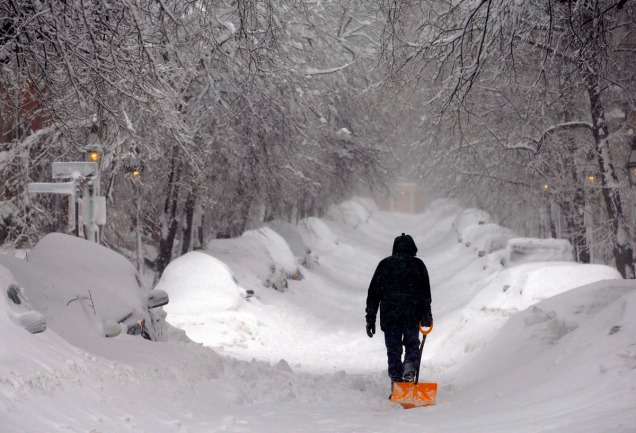
This has been an interesting winter for Boston. Yes, lots of other places have had just as bad–or even worse–conditions and I don’t want to minimize that. But Boston has unique problems.
Shouldn’t they have been prepared?
I mean–winter’s happen every year. And every year, Boston has to deal with snow. What’s the big deal? Homeland Security Watch has this to say,
“Boston is a city that can handle a snowstorm. Indeed, it can handle any single blizzard. What is causing problems is the quick succession of substantial snow storms in the past month, along with sub-freezing temperatures preventing melting, that has slowly choked the transportation arteries of this densely built city. This is leading to an unfortunate set of cascading outcomes that normally would not be a concern during normal winter weather.”
From the outside, it looks like Boston is simply incompetent, when the truth is that this is not a normal problem. It is what Harvard professors Dutch Leonard and Arn Howitt refer to as an “emergent crisis.” Emergent crises are especially hard to recognize and treat for 3 reasons.
- They look like normal problems. Boston has had snow before. This is a normal problem and has a normal response: plowing.
- Since they look like normal problems, the experts sent to deal with it, tend to get tunnel vision. Leonard & Howitt state, “Often, experts (and, perhaps even more so, teams of experts) are not adept at recognizing that their approach is not working. Often, they ignore “disconfirming evidence” (i.e., the flow of data tending to show that what they are doing is not working) and “escalate commitment” to their existing approach. The person or team working on the situation may not only believe that they are about to succeed (with just a little more effort and time) but also feel pressure not to lose face if they fail to handle the assigned situation.”
- Finally, emergent crises are especially difficult to treat because they have all of the qualities of a non-standard emergency (…”the difficulty of recognizing novelty, the challenge of creativity and improvisation of new approaches and designs under stress…”), with already deployed teams not trained in this kind of emergency. It can be hard to convince organizations already working on the problem to shift gears.
In a broader sense, emergent crises are a good example of how hard it is for responders to recognize data from noise. As I wrote here, one of the main jobs of cities, organizations, individuals, etc is to process information from the environment. More often than not, the information is meaningless (you don’t care that your shirt is touching your shoulder), but sometimes it matters (if your shirt is caught in a corn husker, suddenly you care it’s on you). But knowing what is important and what isn’t is extremely difficult since we generally don’t have the big picture or know the future (by the way, that’s why teams are so useful–each person holds a different part of the picture. Working together makes it easier to do stuff right.).
So what do we do?
Well… nothing. The human condition is such that we will always struggle a little bit to recognize new problems. But I think there’s a Communications theory that can help a little. It’s called Groupthink– you may have heard of this already. Essentially, when groups value consensus, they tend to ignore data which opposes or contravenes their decisions and plans. Group Think could be complicating the emergent crisis/data-noise problem. But there is a solution: diversity. When groups value contrary opinions, they avoid tunnel vision and are much more successful at recognizing emergent problems.
Further reading
- Emergence Theory wiki
- Complexity in Organizations wiki with a link to Complexity Theory in general
- Groupthink wiki
- Leonard & Howitt’s “…Disaster Type Differences” journal article. (Easy to skim and pretty interesting)
- Boston Globe article which describes the “cascading” problems Boston’s snow is causing for area hospitals. Good example of complexity theory.
- Federal Gov perspective and source material.
The succession of snowstorms and blizzards is certainly an emergent problem, but I think Boston demonstrates how complex systems can solve problems. The emergency responders have been doing a fantastic job working together, the city government has been quick to put in place adaptive solutions
LikeLike
Absolutely! I love how they’re offering Red Sox tickets for people who shovel out fire hydrants, for instance. Brilliant and creative. Really demonstrates the power of complex adaptive systems, like you said.
LikeLike